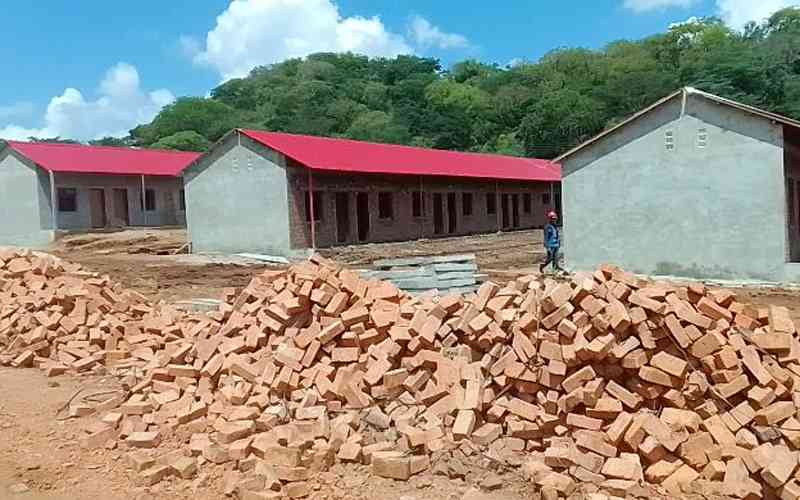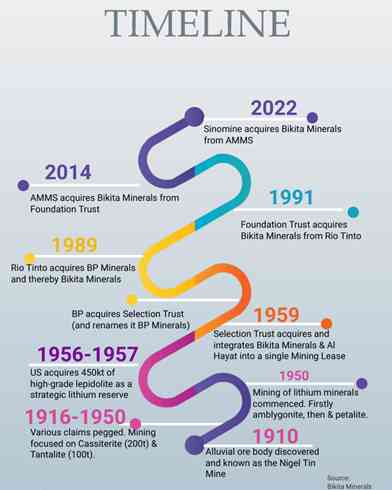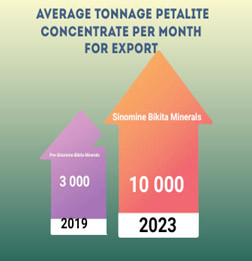
Lithium miner, Bikita Minerals in Masvingo province has been registering steep surges in production of late, but its employees see no reason to celebrate this resurgence as they say working conditions are deteriorating.
Records show that Shenzhen-listed Sinomine acquired Bikita Minerals for US$180 million in January 2022 and announced a US$300 million investment to increase production and extend the life of the mine.
Bikita Minerals was previously controlled by German investors through African Minerals Ltd which held a 55.4% stake in the mine.
The minority stakeholders were AmZim Minerals Limited (18.6%), Dzikamai Mavhaire (16.0%), Bishop Nehemiah Mutendi (5.25%) and Chekilli Investments (4.75%).
During the Covid-19 induced lockdown in 2020, it was reported that Bikita Minerals was teetering on the brink of collapse.
The company offered voluntary retrenchment packages to all employees as markets declined and operations faced numerous hurdles.
The company looked for fresh capital from prospective Chinese investors who, according to insiders, demanded that the workforce be trimmed as a pre-requisite for an acquisition, resulting in massive voluntary retrenchment offers in 2020.
After the acquisition, Sinomine immediately poured in millions for the expansion of the existing technical grade petalite lithium plant, and the establishment of a new chemical grade spodumene lithium plant.
- Clinic brings relief to villagers
- Zim lithium mines being sold for a song
- Zimbabwe deals help China tighten African lithium grip
- Pushback over Chinese lithium push
Keep Reading
An investigation done in partnership with Information for Development Trust, a non-profit organisation supporting investigative journalism in Zimbabwe and southern Africa, has revealed that the new owners are producing 10 000 tonnes of lithium petalite concentrate per month for export on average.

Paper trail indicates that production was averaging a lowly 3 000 tonnes just before the takeover.
Between December 2022 and February 2023, the company produced 30 000 tonnes of petalite concentrate, which was exported mainly to China and Japan and generating US$75 million.
The product was sold at US$2 500 per tonne, up from US$600 per tonne.
Before Sinomine took over, production was less than 90 000 tonnes of petalite per year, with 430 permanent employees, 120 casuals and around 300 contractor staff
The company now employs 450 permanent staff and 230 casuals, with contractor staff having shot up to 1200 after the mine increased the number of contracted companies.
Petalite contains about 4% lithium, a key raw material in the production of solar batteries, mobile phone components and ceramics.
Employees complain of ill-treatment and withdrawal of incentives they enjoyed under the previous employer.
In 2018, the old owners introduced a cost of living allowance (Cola) for all the workers, but the new shareholders have scrapped the benefit, insisting that the company is yet to break even.
This, the investigation established, is making it difficult for them to cushion themselves against rising inflation and the resultant cost of living.
Inside sources indicated that the new management is insisting that replacing the Cola with target bonuses is meant to motivate higher production, but workers feel this is unfair.
A female employee who chose to have her identity hidden for fear of reprisals said she went on maternity leave for three months in 2022 and was automatically disqualified from the targeted bonuses since she was away from work.
Other employees who were also interviewed alleged that the management was already reneging on paying the bonus as the workers were meeting the targets.
A middle-level employee, who also requested anonymity alleged that stringent conditions were introduced to reduce chances of workers qualifying for the bonus.
“For artisans working on a 7am to 5pm shift to qualify for 100% bonus, they must work for at least 21 days per month. If one misses a day for whatever reason, the bonus rate is drastically cut,” the employee said.

“It’s even worse for the ordinary shift workers who must clock 26 days failure of which their bonus rates will be cut to almost nothing.
“Under the current working conditions, one must never get ill, lose a loved one or request a day off for whatever other reason.”
Despite rising inflation amid intense lobbying by the Bikita Minerals workers’ committee, employees still get paid using old industry minimum rates as the National Employment Council (NEC) for the mining industry has not gazetted new rates since late 2022.
The guidelines set the minimum wage for the lowest paid employee at $217 299.84 — equivalent to just over US$200 at the official rate but only some US$145 on the more realistic parallel market.
The highest paid employees received $503 994.78 or US$337 on the parallel market.
In the course of investigations, it was also learnt that employees in some departments were not allowed to take their regular off days if there were urgent tasks to be completed.
“In the dispatch department, for example, they work from 7am to 5pm for six days, but recently they worked for two weeks without any off day, because there were lots of petalite bags to clear and long queues of trucks waiting to load,” said another source.
Worker’s committee chairperson, Stanley Dhliwayo said the management rejected proposals for wage adjustments presented at a meeting on March 13.
“Management said the company borrowed heavily from a Chinese bank so they could not commit to an increment.
“As workers, we don’t agree with that because production has been ramped up,” said Dhliwayo.
He said his committee would raise the issue of target bonuses at the next meeting with management.
Dhliwayo described as “grossly unfair” and unlawful, the ad hoc policy to deny workers on regular, compassionate and sick leave the bonus.
The company is constructing single quarter hostel-type accommodation for employees who will be displaced from the old compound due to expansion of the mine.
This has riled married employees, who charged that the hostels are unsuitable for families.
The Bikita Minerals human resources officer, Harris Dumbu, dismissed allegations of ill-treatment of workers claiming that all employees were treated fairly and that the company abides by the country’s labour laws.
“We give our workers off days and it does not affect their wages.
“The target bonuses are paid in a fair and transparent manner and we have never received any written complaints from anybody regarding those issues,” said Dumbu, who however could not provide documents to support his claim.
“We cannot respond to rumours,” he said.
Some of the companies contracted by Bikita Minerals, according to the employees, is another source of pain they are ill-treating them.
Contracted companies include Hocean (haulage) Kinsey (roads and dump trucks), KW Blasting (blasting), Madlux (casual labour), PEI (excavation and earth-moving), Jadecon (construction and engineering), Sinohydro (geology), Armor Shield (security), Hiphonic (casual labour), Rebnek (security) and Jiangsu (construction).
Among the companies accused of ill-treating workers is PEI, which was contracted to do excavation and earth moving.
The company is owned by Timothy Holden, the son of Speedy Holden who owned the mine between 1991 and 2014 and is being accused of not providing protective clothing like worksuits, safety shoes, helmets, gloves and glasses, in contravention of section 6(d) of the Labour Act.
The company was accused of delaying paying the salaries while getting days off to rest is a struggle for the employees who are being forced to live in sub-standard makeshift cabins despite the availability of land for house construction.
Holden claimed that accusations against his company were the work of vindictive ex-employees who were fired for negligence.
“All persons are paid well. They have new PPE.
“They work three weeks on a minimum of one week off and are paid cash in lieu of leave.
“All employees have the right to take sick leave, holiday leave and other leave days,” he insisted.
Holden did not cite any figures, but one employee insisted that the company did not have consistent basic salary regimes.
“He just pays us what he feel like. We don’t get pay advice slips,” said the employee.
“The HR (human resources) department advises of any grievances and we like to ensure a happy working environment,” he said.
Holden admitted that some wages which were due in 2022 were only paid this year, but ducked allegations on employees working without contracts or payslips.
He also claimed that all workers were on yearly contracts which were handled by a third party to ensure transparency, but this was disputed by our sources.
Holden claimed rains had delayed the construction of decent accommodation for the workers.
“We were granted a piece of land to build accommodation as there are shortages at the mine,” he said.
“Now that rains are coming to an end, we will start the civil process. Equipment is being mobilised for the work.”
Madlux, another company contracted by the mine, is also accused of abusing employees.
The company employs 105 casual labourers commonly known as dhoba-dhobhas who handpick and sort ore in the mining areas.
In 2022, the relevant national employment council (NEC) in Bulawayo and the Zimbabwe Diamond and Allied Minerals Workers Union (ZDAMWU) failed to reach a settlement over a case brought against Madlux.
The union sought conciliation on underpayment of wages, non-payment of gratuity, leave days and overtime, non-grading of overtime and the payment of employees without payslips.
The matter has since been transferred to the NEC at the Harare office for further arbitration.
Luckson Madhende, who has always been believed to be Madlux director, denied having any control over the company that owes the workers more than US$18 000 in wages.
Ironically, Madhende is now implicating Madlux.
In a telephone interview Madhende said: “I, too, am a victim because the mine has not paid me for three months.
“I am ill and have not been able to work since October 2022. They said they can’t pay those that are not at work.
“To me, Madlux is just a name and I don’t know who is in charge.”
Commenting on allegations of abuse of workers at the mine, ZDAMWU general secretary Justice Chinhema said the case of Bikita Minerals was a microcosm of issues at a number of foreign mining investments in the country.
“Bikita Minerals is a case among many others countrywide and we will not tire to hold them to account,” Chinhema said.
“We will soon be at Bikita Minerals to try and reach an agreement with management or we will be left with no option, but to engage the National Employment Council.”
He stated that the ZDAMWU had constantly campaigned against labour brokers, and the union expected that provisions made in the Labour Amendment Bill would enable contract workers to enjoy conditions similar to those of permanent staff.
Dumbu, however, did not dismiss the possibility of ill-treatment of workers by companies contracted by Bikita Minerals.
“We encourage the contracted companies to treat their workers fairly but I cannot go to the extent of managing their affairs,” he said.









